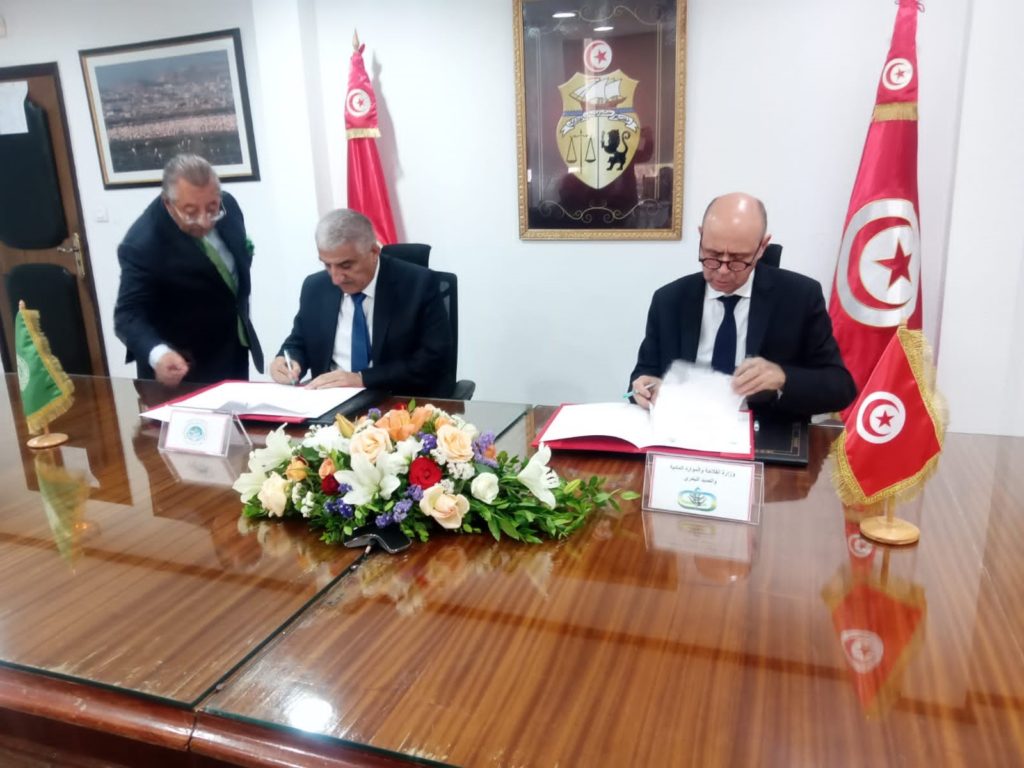Convention of Technical Cooperation Between the Tunisian Ministry of Agriculture, Water Resources, and Fishing and the Arab Centre for the Studies of Arid Zones and Drylands’ACSAD

A convention of technical and scientific cooperation has been signed between the Tunisian Ministry of Agriculture, Water Resources, and Fishing and the Arab Centre for the Studies of Arid Zones and Drylands “ACSAD” to support the efforts exerted by the Ministry to promote the agricultural sector, benefit from the modern technologies in improving the agricultural development areas, applying the sound management of natural and water resources, promoting cadres’ capabilities, and taking the advantages from various studies, programs. And projects conducted by the Arab Centre in all Arab countries.
The Tunisian Minister, Dr Muhammed Ilyas Hamzeh and the ACSAD’s Director-General, Dr Naser Edin Obeid, have signed the convention at the headquarters of the Tunisian Ministry of Agriculture, Water Resources, and Fishing during Dr Obeid’s current visit.
The convention aims to enhance water security, raise irrigation efficiency, rationalize water uses, apply water harvesting, preserve, develop, maintain, and share genetic assets, varieties, and breeds, and upgrade the applied scientific agricultural research to solve the agrarian sector’s problems as well as applying the modern technologies in the agricultural sector development, adapting with climate changes, mitigating its severe impacts, and developing programs of tolerant-to- drought implants.
The convention provides the necessity to activate genetic improvement programs, preserve the distinguished DNA of local breeds, improve and promote the farming animal systems, improve the nutritional value of the agricultural waste and manufacture them to feed animals and develop the fodder crops and benefit from the Arab Centre’s experiment in the field of sheep breeders’ networks, animal health programs development, and pandemic diseases study and how to dominate and control them.
It also stipulates the need to grow and increase the production by eliciting high productive cereal varieties tolerant to drought, spreading the conservation agriculture, fodder crops the rain-fed crops and irrigated ones that are tolerant to drought too, in addition to suitable pastoral plants varieties, developing the agricultural treatments of palm and fruit trees, introducing new varieties of fruit trees similar to pistachio, plants protection, and modern technologies in controlling pests.
The convention also provides the need to activate genetic improvement programs, preserve the distinguished DNA of local breeds, improve the farm animals’ systems, as well as the nutrition value of the agricultural waste and manufacture them to feed animals and enhance the fodder crops, take advantage of the Arab Centre’s experience in the field of sheep breeders networks, developing the animal health programs, and studying pandemic diseases to control them.
It also sets down the necessity of the optimum utilization of the natural resources through the integral management to raise the water use efficiency, applying the modern irrigation and spreading water harvesting, preparing the plan the optimal land use, controlling desertification, restoring degraded lands, studying climate changes impacts on natural resources and plant cover, the integrated management to sustain the pastoral resources and developing the efficiency of pastoral nurseries, and lay on the systems to restore biodiversity in the forest areas to secure the preservation on local species and varieties.
In extension and rural development, the convention calls for the need to develop the E-extension by constructing E-platforms to convey and diffuse scientific research results for farmers, carrying out extensional, developmental and applicable research, and designing development programs to enhance the role of the rural woman.
On the other hand, in the presence of the Tunisian Minister of Agriculture, the ACSAD’s Director-General and the Director-General of the Office of Livestock and Providing Pasture in Tunisia, Mr Ezedin Shalghaf, have signed a cooperation convention to dedicate a joint developmental research station in “Swaff” village followed the Office of Livestock and Providing Pasture in the Republic of Tunisia. This station is concerned with the applied research to solve the problems facing implementing the planned agricultural programs and achieving productivity plethora, efficiency, and sustainability.
The convention also stipulates the importance of unifying the joint labor, benefiting from the available scientific-technical, developmental and financial potential, and getting involved and coordinating with all the related bodies.
It also provides the necessity of applying sustainable agriculture development programs and the smart agriculture programs, the integral and sustainable management of the plant and animal resources and their production assets to achieve high efficiency and revenue in investing them. The convention’s cooperation pillars included: livestock, plant wealth, production development and improvement, and natural resources management.




